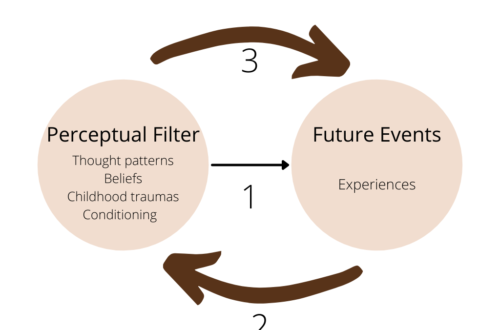Understanding how to let go of outcomes you can’t control
What is control?
Does your mind excessively plan out the meeting in your head to make sure it goes how you planned? Are you stressed about a conversation with someone and ruminate about it in your head? Do you try to plan out everything you will do today in your head? If you are a student, do you ruminate about a test after completing it? Do you try to calculate what mark you’ll get?
All of these are examples of control. The mind is interesting in the way it works. It tries to control outcomes even when it knows it can’t control them. It’ll try to constantly think or ruminate about a situation to give a false sense of control.
Trying to control outcomes that we can’t control or worrying excessively about outcomes is harmful to the body and mind. It often leads to overwhelm and burnout which is why letting go of outcomes we can’t control is important.

However, control is not always a bad thing especially when we have control over a situation but it can become problematic when we try to control things that we truly have no control over or something that we can’t change.
For example, have you ever given a test and then ruminated on how it went? You know you can’t change what you wrote but yet you keep thinking about how you could have changed it or made it better or how changing that one thing might give you a better mark. This is all an attempt of the mind to control the outcome which is the mark on the test.
Essentially the mind tries to control when it wants a specific outcome. To gain that outcome, the mind will stress about that situation until it obtains its desired outcome. The mind will overthink, ruminate, or plan unnecessarily. While there are certain things that are in our control, many things are not in our control. It makes sense to think about things we can control but not about the things that we can’t control. But how do we know whether or not we can control an outcome?
How to find out whether what we are trying to control is in our control or out of our control
The first step to determining whether something is in our control or not is asking yourself can you control the situation? This may sound simple but it works. Consciously most of us are generally aware of what we can or can’t control so bringing awareness to this fact may help you come out of autopilot.
If you can, make a clear plan on what you need to do to obtain your desired outcome. For example, if you want to start working out, sign up with a gym near you and start going at least 3x a week. This is in your control and doable.
If something is not in your control, such as winning a lottery, realize that you can’t do anything about it and that it is completely up to chance.
However, most things in life tend to be a combination of the two. Oftentimes, we can control some aspects and not others of the situation. For example, when we’re applying for a job, we can control where we apply, how often we apply, and the quality of our applications. But we cannot control the outcome. We cannot control the recruiter’s decisions.
However, our minds may try to do so by stressing about the situation, thinking about the response of the recruiter, checking the email constantly, trying to apply to as many jobs so you can get one, and not allowing ourselves to feel happy unless we get what we want.
Another fundamental way to know that you are trying to control outcomes too strongly is that your body tells you. Your body will give you signals. Oftentimes, trying to control outcomes leads to anxiety. This can be felt in the body and mind as the following sensations: tight chest, racy mind, brain fog, fatigue, overwhelm, stress, lack of clarity, headaches, and dizziness. These are generally the symptoms that I feel.
What stops us from letting go of outcomes we can’t control?
Letting go of control is not an easy task but it is quite simple. All you need is to become aware of the fact that you are trying to control and then make an intention to let it go. Sounds simple right? But it is easier said than done.
There are four obstacles that may come our way when trying to let go of outcomes you can’t control.
1. Fear
Fear is often the biggest reason a person can’t let go of controlling outcomes. The reason we try to control is fear. Think about it, if you weren’t so afraid of failing, you wouldn’t try hard to control the situation. If you are afraid of failing a test, you’ll probably do everything you can to avoid failing such as studying hard and ruminating about the test even after it is done just so you can make sure that you answered correctly. Or perhaps you have a habit of talking it out with everyone and asking everyone after the test what they wrote.
Sometimes this stress of trying to control the outcome can also backfire and cause us to procrastinate. You may have procrastinated studying till the night before the test due to that fear of failing. This control also leads to resistance in the mind and body. Resistance may show up as procrastination.
2. Telling ourselves to let it go
Now it may sound logical to tell ourselves to let go of something. But the nature of the mind doesn’t work that way. If I say to you let go of the thought of the purple elephant. What comes to your mind? Did you think of the purple elephant? Focusing on the situation that you want to let go of is often counterproductive. Forcing ourselves to let go only backfires.
3. Ruminating in the mind
Intrusive thoughts and ruminating on the thoughts you get is one way the mind prevents us from truly letting go of a situation. When we keep thinking about a situation, it is difficult to overcome it.
4. The need for perfection
The need for perfectionism is also a way that control disguises itself. The need for perfection is a way the mind likes to control outcomes. If we don’t submit a report until it is perfect, we reduce the chances of failure. Thus we try to make things perfect so we could increase our chances of the desired outcome. However, when this need for perfection becomes excessive or when we procrastinate to make things perfect, this need to control can impede with the outcome we desire. Additionally, perfectionism may block you from truly loving yourself.
How to truly let go of outcomes you can’t control
1. Awareness
The first step in letting go of control is awareness. You must be aware that you are trying to control a situation or an outcome. You must be able to catch yourself as you’re doing it to break the pattern.
2. Ground yourself in the present moment
The second step is to ground yourself in the present moment. Control resides in the mind or the ego. The ego tries to control situations because of fear. To combat control, simply thinking about letting go or ruminating will not help because the problem exists in the mind. The best solution is to get out of the mind where the problem does not exist. You can do this using several grounding techniques.
You can get out of your mind and into the body by feeling your body’s sensations and returning to your body. Orient to the environment around you and see, hear, and touch what is around you. Try focusing on your breathing or counting your breaths.
3. Reframe your perspective and have faith
The third and final step is to replace your habit of controlling with a better thought pattern. One way to do that is to shift the way you think about the situation so you have a new perspective on it. For example, rather than stressing about when you will lose 50 pounds, focus on the progress you made working out. Focusing on progress will help you realize that you are closer to your goal thus reducing the necessity to control. If you are ruminating about the test, tell yourself that you did your best on that test and now there is nothing more to do and nothing you can do so relax.
Focusing on the progress made or shifting the way you think about the situation is a healthier way to reprogram the mind. Another way to shift your perspective is to have faith. Create a state of faith in your mind and body. This will allow you to truly release control over the outcome.
To summarize, the mind may try to give us a false sense of control through rumination, excessive planning, and overthinking. This false sense of control allows one to cope with their fears about the situation but isn’t helpful as it can lead to burnout and overwhelm. However, you can let go of outcomes you can’t control by becoming aware of when you try to control, ground yourself in the present moment, and reprogram your mind. Don’t forget to have faith!


One Comment
Lillian
Thank you for sharing this informative post. You nailed it explaining your ideas. Looking forward to reading more from you.